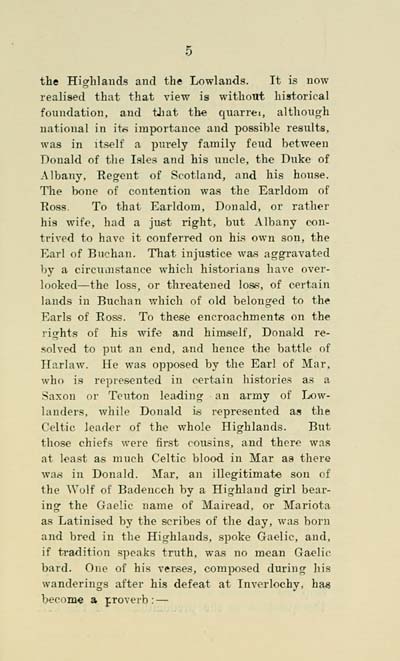Download files
Complete book:
Individual page:
Thumbnail gallery: Grid view | List view

the Highlands and the Lowlands. It is now
realised that that view is without historical
foundation, and tliat the quarrei, although
national in it^i importance and possible results,
was in itself a purely family feud between
Donald of the Isles and his uncle, the Duke of
Albany, Regent of Scotland, and his house.
The bone of contention was the Earldom of
Ross. To that Earldom, Donald, or rather
his wife, had a just right, but Albany con-
trived to have it conferred on his own son, the
Earl of Biichan. That injustice wa.s aggravated
by a circumstance which historians have over-
looked — the loss, or threatened lose, of certain
lands in Buchan which of old belonged to the
Earls of Ross. To these encroachments on the
rights of his wife and himself, Donald re-
solved to put an end, and hence the battle of
Harlaw. He was opposed by the Earl of Mar,
who is represented in certain histories as a
Saxon or Teuton leading an army of Low-
landers, while Donald Ls represented as the
Celtic leader of the whole Highlands. But
those chiefs were first cousins, and there was
at least as much Celtic blood in Mar as there
was in Donald. Mar, an illegitimate son of
the Wolf of Badencch by a Highland girl bear-
ing the Gaelic name of Mairead, or Mariota
as Latinised by the scribes of the day, was born
and bred in the Highlands, spoke Gaelic, and,
if tradition speaks truth, was no mean Gaelic
bard. One of his verses, composed during his
wanderings after his defeat at Inverlochy, ha«
become a jroverb : —
realised that that view is without historical
foundation, and tliat the quarrei, although
national in it^i importance and possible results,
was in itself a purely family feud between
Donald of the Isles and his uncle, the Duke of
Albany, Regent of Scotland, and his house.
The bone of contention was the Earldom of
Ross. To that Earldom, Donald, or rather
his wife, had a just right, but Albany con-
trived to have it conferred on his own son, the
Earl of Biichan. That injustice wa.s aggravated
by a circumstance which historians have over-
looked — the loss, or threatened lose, of certain
lands in Buchan which of old belonged to the
Earls of Ross. To these encroachments on the
rights of his wife and himself, Donald re-
solved to put an end, and hence the battle of
Harlaw. He was opposed by the Earl of Mar,
who is represented in certain histories as a
Saxon or Teuton leading an army of Low-
landers, while Donald Ls represented as the
Celtic leader of the whole Highlands. But
those chiefs were first cousins, and there was
at least as much Celtic blood in Mar as there
was in Donald. Mar, an illegitimate son of
the Wolf of Badencch by a Highland girl bear-
ing the Gaelic name of Mairead, or Mariota
as Latinised by the scribes of the day, was born
and bred in the Highlands, spoke Gaelic, and,
if tradition speaks truth, was no mean Gaelic
bard. One of his verses, composed during his
wanderings after his defeat at Inverlochy, ha«
become a jroverb : —
Set display mode to: Large image | Transcription
Images and transcriptions on this page, including medium image downloads, may be used under the Creative Commons Attribution 4.0 International Licence unless otherwise stated. ![]()
| Early Gaelic Book Collections > Hew Morrison Collection > Battle of Harlaw > (7) |
|---|
| Permanent URL | https://digital.nls.uk/77189692 |
|---|
| Description | A selection of items from a collection of 320 volumes and 30 pamphlets of literary and religious works in Scottish Gaelic. From the personal library of Hew Morrison, the first City Librarian of Edinburgh. |
|---|
| Description | Selected items from five 'Special and Named Printed Collections'. Includes books in Gaelic and other Celtic languages, works about the Gaels, their languages, literature, culture and history. |
|---|

